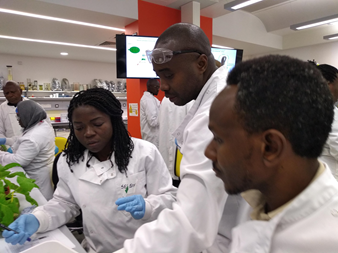Sergine Ngatat is Research Assistant and Lab Manager at the Molecular Biology Laboratory, International Institute for Tropical Agriculture, Cameroon.
In summer 2019 Sergine was awarded a fully-funded place on the CONNECTED Virus Vector Vice Versa (V4) development programme for early career researchers. It meant travelling to Bristol, UK, where she worked with fellow delegates from other Sub-Saharan African countries.
When asked for V4 highlights, Sergine starts by listing lecture and lab sessions covering
- general plant virology
- diagnosis of plant viruses, and
- DNA barcoding and analysis of sequencing data.
She adds that a field visit that formed part of the training helped her recognition of disease symptoms, and that she also valued the ‘communicating your science’ training provided.
Using the new learning
“Since attending V4 my understanding of the analysis of sequencing data has improved,” says Sergine. “I communicate better with colleagues, and coming together with others at the V4 training event I know that I’ve gained more self confidence in my research works and in communicating my science.
“On my return I shared many of the new skills I had learned with colleagues in my institution and in the university. “
Sergine is also pleased that subsequently she has provided training to young researchers of the NARS on basic molecular biology technics and virus diagnosis.

Collaborations
Her V4 attendance also created an unexpected bonus opportunity. During V4 Sergine was nominated by fellow delegates to attend the Grand Challenges Annual Meeting 2019 in Ethiopia: “This was made possible by CONNECTED and, as with V4, I met a wide range of other researchers,” she says.
“I learned the importance of finding ways to translate our science into solutions to solve our daily problems. The meeting also developed my understanding of how we are more moving into a digital world, combining ICT tools into health systems to facilitate healthcare, or into agricultural research for digital agriculture.
“By being a member of The CONNECTED Network I have made contacts with various African scientists, which means we can now share experiences and collaborate, brainstorming research project ideas on plant health challenges.
“I have also established collaborations with UK-based researchers who can support proposal developments, as Principal Investigators, in response to funding calls.”
Using online resources
The in-person events Sergine has attended have been useful to her development, but she has also made good use of online resources and opportunities:
“I attended the ‘Springboard to Impact’ virtual conference in late 2020,” she says. “And I have been using resources provided free of charge on the CONNECTED website, including tools for sequence and genome analysis, funding opportunities, and reports and publications.”
Looking ahead, Sergine has clear views about how the network can benefit others: “In future years, I hope to see The CONNECTED Network further develop by providing more funding opportunities to run more research projects, promoting more mentoring between network members to help young scientists to grow in their career, and publicising more about CONNECTED to make the network grow.
“My involvement in CONNECTED has improved my capacity and for me has been like a spring that will continuously contribute to accelerate my professional development in agricultural research.”

